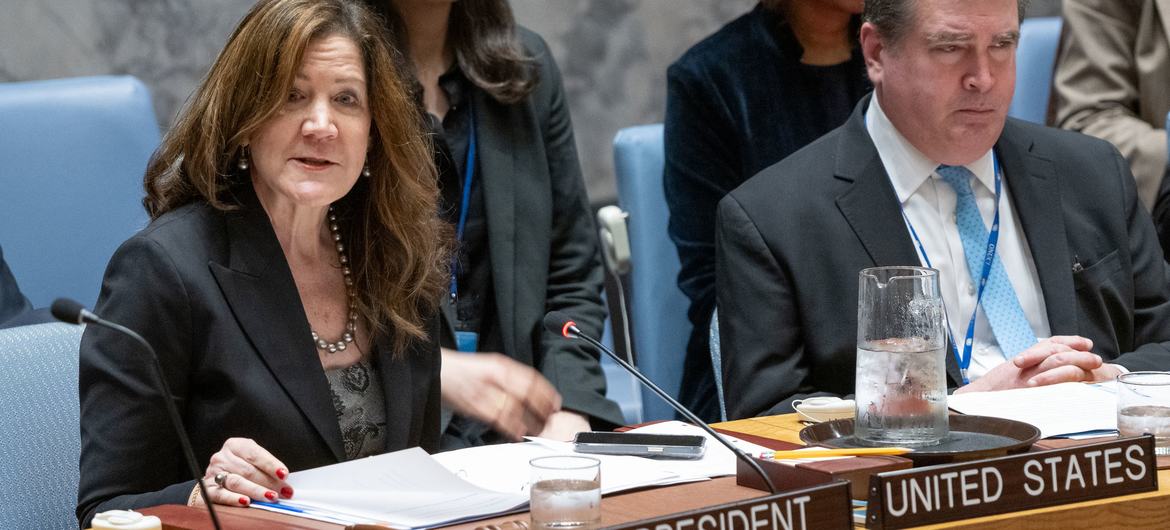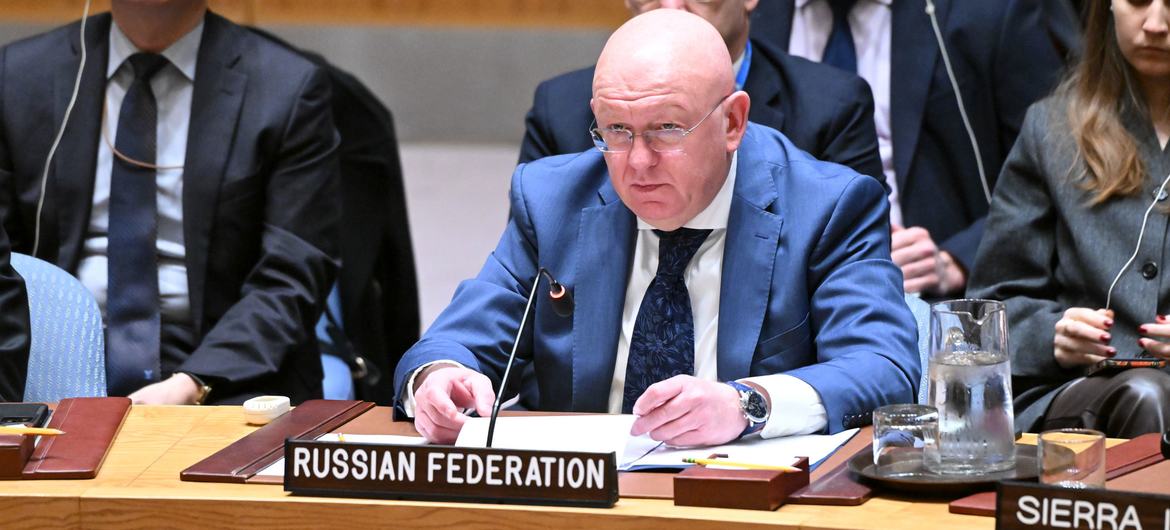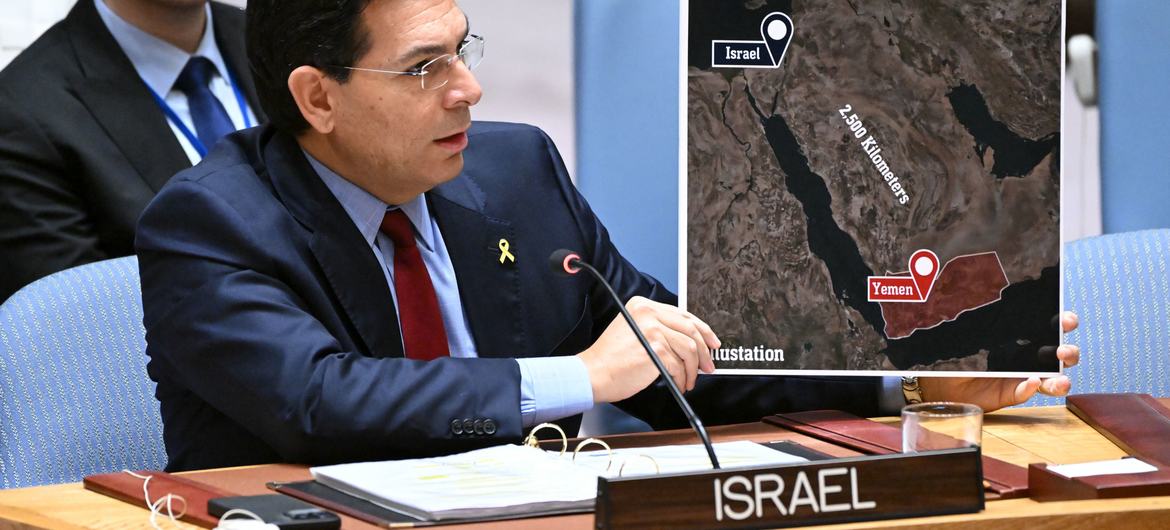Briefing the Security Council in New York, Khaled Khiari, the Assistant Secretary-General for Middle East, Asia, and the Pacific, raised concerns about a dangerous escalation in the Middle East.
He highlighted the attacks in Israel and Yemen, along with the Red Sea, as alarming, emphasizing that further military escalation could disrupt regional stability with negative political, security, economic, and humanitarian consequences.
“We need to take action to reverse this negative trend and support comprehensive efforts to end conflicts in the Middle East,” he stressed.
“We must maintain a path towards sustainable peace and stability that benefits all people in the region.”
UN Photo/Eskinder Debebe
UN Assistant Secretary-General Mohamed Khaled Khiari addresses the Security Council meeting on threats to international peace and security.
Attacks on the rise
The recent developments follow a spike in Houthi attacks on Israel and vessels in the Red Sea and the Gulf of Aden.
According to Khiari, the Houthis have claimed at least 11 attacks on Israel since December 13, utilizing ballistic missiles and Uncrewed Aerial Vehicles (UAVs).
Khiari informed the Council that retaliatory airstrikes by Israel on December 19 targeted energy and port infrastructure in Houthi-controlled areas, resulting in civilian casualties and widespread damage.
Damage and casualties
Amid these escalations, Khiari highlighted the destruction and casualties, including damage to civilian structures, power stations, and ports.
He specifically mentioned the attacks on an elementary school in Ramat Gan and a residential neighborhood in Jaffa, causing injuries and property damage.
The strikes also hit Sana’a International Airport and Red Sea ports, affecting humanitarian operations in Yemen.
UN in the crosshairs
Khiari expressed concern over the impact on humanitarian operations, especially after the strikes at Sana’a International Airport.
He emphasized the importance of protecting humanitarian workers and called for the immediate release of detained UN personnel by the rebels.
Grave concern
Khiari reiterated the Secretary-General’s apprehension about the escalating situation and stressed the need for all parties to abide by international law, particularly humanitarian law.
He condemned attacks by the Houthis, including the recent incident involving the vessel Santa Ursula, and called for adherence to Security Council Resolution 2722 (2024) demanding a cessation of attacks in the Red Sea.

UN Photo/Eskinder Debebe
Dorothy Shea (Left), Deputy Permanent Representative of the US to the UN and President of the Security Council for December, chairs the Security Council meeting on threats to International Peace and Security in Yemen and Israel.
USA: ‘Past time for Houthis to cease reckless behavior’
Dorothy Shea, speaking on behalf of the USA, condemned the recent Houthi attacks on Israel and reiterated American support for Israel’s right to self-defense.
She called on the Security Council to consider further actions against the Houthis and urged accountability for Iran’s involvement.
Shea emphasized the US military operations against Houthi infrastructure, stating they were in line with international law and the right to self-defense.
Israel must coordinate operations
She stressed the importance of Israel coordinating its military actions to avoid harm to civilians or infrastructure.
The US expressed gratitude for the safety of the World Health Organization delegation following the Sana’a airport strike and highlighted the critical aid efforts in Yemen.
“It is time for the Houthis to stop their reckless behavior, and consequences should follow,” she concluded.
United Kingdom: ‘No justification’ for Houthi attacks
Barbara Woodward, the UK’s Permanent Representative to the UN, denounced the continued Houthi attacks on Israel and international shipping in the Red Sea, emphasizing that there is no justification for such actions.
She underscored the risks of regional escalation and attributed the worsening humanitarian and economic conditions in Yemen to the Houthi aggression, with Iran playing a significant role in fueling the conflict.
Woodward called for Israeli actions to align with international humanitarian law, stressing the protection of civilians.

UN Photo/Evan Schneider
Vassily Nebenzia, Permanent Representative of Israel to the UN, briefs the Security Council meeting on threats to International Peace and Security in Yemen and Israel.
Russia: Threats to civilians ‘unacceptable’
Russia’s Ambassador, Vassily Nebenzia, condemned the Houthi attacks on Israel, emphasizing the unacceptable nature of threats to civilians and infrastructure.
He called for restraint from all parties involved in the conflict and criticized disproportionate military responses.
Nebenzia highlighted the need for progress on the political front to reduce military activities by the Houthis.

UN Photo/Evan Schneider
Danny Danon, Permanent Representative of Israel to the UN, briefs the Security Council meeting on threats to International Peace and Security in Yemen and Israel.
Israel: ‘We have had enough’
Israel’s Ambassador, Danny Danon, expressed shock at the attacks on Israeli civilians and communities by the Houthis.
He recounted the impact of the attacks on schools and playgrounds, emphasizing the toll on civilian lives.
Danon called for an end to the systematic terror inflicted by the Houthis on Israel and urged the Council to take action against such attacks.
He highlighted the distance between Israel and Yemen, questioning the Houthis’ motives for targeting Israel.
“It’s time for the Houthis to stop their radical jihadist hatred for Jews and end these attacks,” he concluded.




